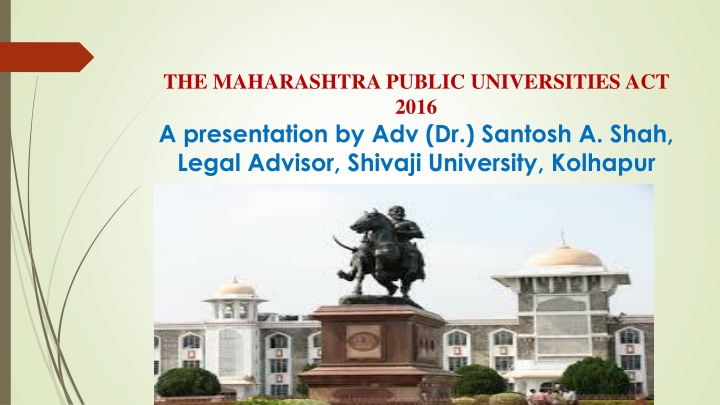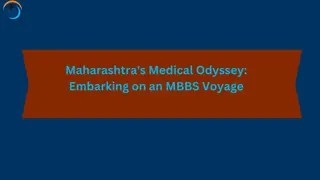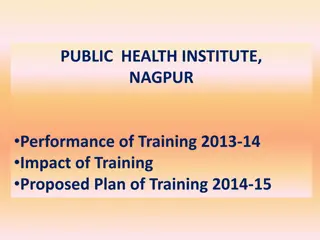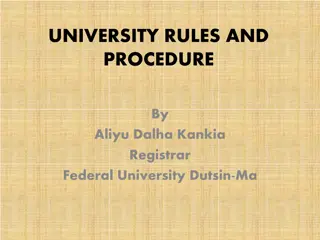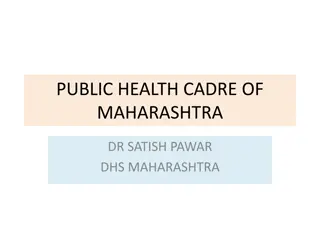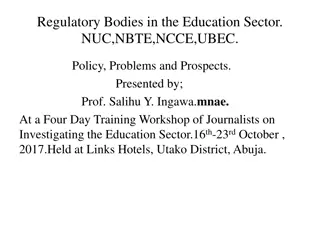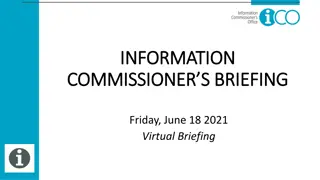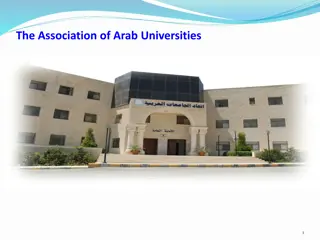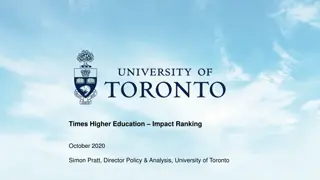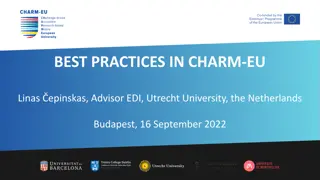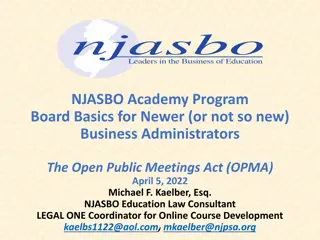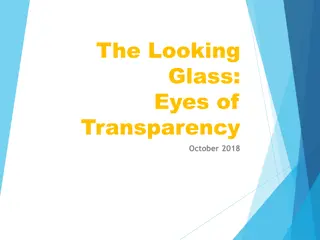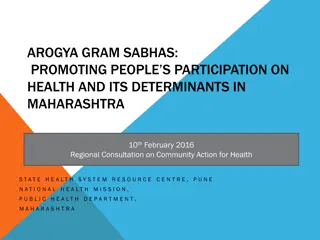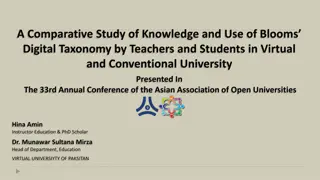The Maharashtra Public Universities Act 2016 - Key Highlights and Recommendations
This presentation discusses the Maharashtra Public Universities Act 2016, focusing on the objectives, academic autonomy, governance structure, and recommendations from the Dr. Nigavekar Committee. It emphasizes the need for transparent governance, financial mechanisms, and educational excellence. The Act aims to enhance higher education through adequate representation, participation, and the establishment of the Maharashtra State Commission for Higher Education and Development.
Download Presentation

Please find below an Image/Link to download the presentation.
The content on the website is provided AS IS for your information and personal use only. It may not be sold, licensed, or shared on other websites without obtaining consent from the author.If you encounter any issues during the download, it is possible that the publisher has removed the file from their server.
You are allowed to download the files provided on this website for personal or commercial use, subject to the condition that they are used lawfully. All files are the property of their respective owners.
The content on the website is provided AS IS for your information and personal use only. It may not be sold, licensed, or shared on other websites without obtaining consent from the author.
E N D
Presentation Transcript
THE MAHARASHTRA PUBLIC UNIVERSITIES ACT 2016 A presentation by Adv (Dr.) Santosh A. Shah, Legal Advisor, Shivaji University, Kolhapur
> OBJECT OFANY LAW : To regulate human conduct and To deal with mischief in society. > INDIAN EDUCATION SYSTEM IS OVER REGULATED BUT UNDER GOVERNED.
DR. NIGAVEKAR COMMITTEE REPORT The University needs to have an open, flexible and transparent governance and administrative structure. cultivate financial mechanism for quality and social audit. It should also independence and a
PANDIT JAWAHARLALNEHRU- A University stands for humanism, for tolerance, for reason, for adventure of ideas and search for truth. It stands for onward march of human race towards even higher Universities discharge their duties adequately then it is well with the nation and the people. objectives. If the
PREAMBLE OF 2016 ACT : Academic autonomy & Excellence Adequate representation process Transformation, higher education Participation of education spheres. Establishment of Maharashtra State Commission for Higher Education and Development. To constitute various boards To repeal the Maharashtra UniversitiesAct, 1994. through democratic strengthening and regulating Universities in social and
Vice Chancellor (Authorities)( Sec. 26) Ex- Officio Chairperson Management Council Academic Council Board of Examination and Evaluation Board of Life Long Learning and Extension Board of National and International Linkages Board of Innovation, Incubation and Enterprise Board of Information Tech Board of students devp Board of sports and phy edu Board of Research
Vice Chancellor (Section 10)( officers) Pro Vice Chancellor - ( sec 13) Registrar - sec. 14 Deans of faculties- sec 16 Finance and Accounts Officer & - sec. 18 Director of Sub campus - sec 19- Director of National and International Linkages,,- sec. 20 Director knowledge resource centre sec 21 Director of Life Long Learning and Extension sec. 22 Director of students National Service Scheme- sec. 23 Director of sports- sec 24 Director of Examination and Evaluation Director of sports and phy edu Director of students devp
Vice Chancellor Chairperson Board of Deans Board of Sub- Campuses Board of University, Departments and Inter Disciplinary studies Board of Post Graduate Education in colleges Ex- officio chairperson of Research and Recognition Committee
Registrar Member Secretary Senate Management Council Academic Council
PROVISIONS RELATING TO DISPUTE RESOLUTION Sec. 9 : Chancellor and his powers Sec. 48 (5) (a, b ) : Powers and Duties of Board of Examination: To investigate and take disciplinary action relating to failure to comply with the order of University for rendering assistance or service in respect of examinations. lapses on the part of candidates, paper setters, examiners, moderators, referees, teachers or any other persons connected with the examinations by a committee of not more than 5 persons. Report of the Committee to the Vice- Chancellor and the Director Board of Examinations and Evaluation shall take disciplinary action as per the decision of the Vice- Chancellor. The decision of the lapses Committee will therefore not come before the Board of Examinations.
SEC. 64 ( F & G) : DIS-QUALIFICATION FOR MEMBERSHIP OF AUTHORITY Additional grounds Wilful omission or refusal to carry out the provisions of the Act, Statutes or ordinances or has acted in any manner detrimental to the interest of the University. Has been punished in any form by the competent authority for committing a mis-conduct.
SEC.79 : GRIEVANCES COMMITTEE : Does not apply to grievances against the State Government
GRIEVANCES COMMITTEE Retired Judge not below the rank of District Judge One Dean Chancellor s Nominee on the Management Council Registrar One Teacher from backword class One non teaching employee nominated by the senate Law Officer of the University Member Secretary
Sec. 81 (1) (b) : Right of appeal to University & College Tribunal : Decision of the grievances committee.
SEC. 6 : SECOND PROVISO : Provision to establish sub campuses or centre or institutions in any foreign country on its own or in collaboration with any other Indian or foreign University or institution with the prior sanction of the Central and the State Government.
Sec2(48)Satellite Centre (48) "satellite centre" means an integral part of an affiliated or conducted college or recognized institution imparting academic programmes, co-curricular, research and extension activities in rural or tribal region, neighbouring the location of such college or institution, established with the object of reaching the unreached, on the terms and conditions specified by the State Government by an Order in the Official Gazette;
Pro-Vice-Chancellor -Sec 13 (13) The Pro-Vice-Chancellor shall, (a) be the principal academic planning and academic audit officer for the academic development programmes, including post-graduate extension programmes and collaborative programmes of the university; (f) accord approval to the appointments of principals and teachers of affiliated colleges and institutions, autonomous colleges and institutions, empowered autonomous colleges, cluster of institutions and recognized institutions or withdraw the same in accordance with the procedure as prescribed in the Ordinances; (g) accord approvals to selection committees for appointment of teachers in the colleges as per the norms of the University Grants Commission and the State Government; teaching, research and
Deans of Faculties: Fulltime salaried officers Responsible for academic planning and audit. Sec. 16(f)- ensure that the teachers' appraisal by students is carried out and the reports thereof are sent to the university authorities concerned;
Sec.34(2) Faculty The university shall have the following faculties, namely: (i) Faculty of Science and Technology; (ii) Faculty of Commerce and Management; Humanities; (iv) Faculty of Inter-disciplinary Studies. (iii) Faculty of
Sec.56(2)(b) Students grievance redressal cell. Students Grievance Redressal Cell,- There shall be Students Grievance Redressal Cell at the University and each college and recognized institutions to resolve the Grievances of Students and to suggest to the higher authorities different ways and means to minimize and prevent such grievances. The functional mechanism of working of Students Grievance Redressal Cell shall be as prescribed by Statutes, prepared in accordance with the provisions of the University Grants Commission (Grievance Redressal) Regulations, 2012, or any other regulations for the time being in force.
Sec.105(10) The Selection Committee, selection process and mode of appointment of principals and teachers of affiliated colleges and recognized institutions shall be as per the guidelines, directions of the University Grants Commission prescribed by the State Government in the Official Gazette. as may be
SEC. 8 : CONTROL OF STATE GOVERNMENT ON UNIVERSITIES : Power inspection of any affiliated, conducted or autonomous collage, recognized institution or University department. of State Government to cause
SEC. 12 : VICE CHANCELLORS POWERS : Power to accord recognition as qualified teachers to the experts from the field of application oriented industries or companies and domain specific experts in various professional skills, working as training experts in private skills education providers and empowered skill development colleges. Recommend to the State Government on the report of the Management Council temporarily alternative arrangements in the interest of students to run the day today academics and activities of the management of an affiliated college, institution or autonomous college of empowered autonomous colleges or cluster of institutions in case of disputes, criminal acts by the management, mis- management.
SEC. 29 : FUNCTIONS AND DUTIES OF SENATE : To approve comprehensive perspective plan and annual plan for location of colleges and institutions of higher recommended by theAcademic Council. To review and adopt the report of students, grievance reddressal report to be presented by the Registrar of the University. learning as
Sec. 102 (9) : Selection and appointment of University teachers : absorption of surplus Universities teachers from other Sec 112 : Recognition of private education provider Sec 113 : Recognition to empowered autonomous skills development colleges Sec. 118 : Shifting college location within the same district within the periphery of 5 Kms. Sec. 119 : Transfer of management of colleges and institutions
Chap XVI : Transitory provisions : Sec. 145- Every employee holding office, whether teaching or other employee in the University shall continue to hold the said office on the same terms and conditions. Sec. 146 (1) All authorities to be re-constituted before 31stAug 2017 . (2) Every person holding office as a member of any authority continue to hold the said office until re- constitution of the said Sec. 148- If any difficulty arises in giving effect to the provisions of this Act, the State Government may by order publish in the official Gazattee remove the same for a period of 2 years from the commencement of the Act. authority.
Reintroduction of university elections, setting up of students development choice-based credit system, cutting down of political appointments through nomination of experts, increasing social reservations in various university bodies, special emphasis on skill development, uniform regulatory regimen for all universities and introduction accounting system. S14(6)(d), S.23(3)(k), S.67, S71(13), S.99(11) councils (SDCs), of modern
To increase the say of students in university affairs, the Act proposes to appoint previous year s topper in a particular faculty as a member of that faculty s board of studies, nominating the president of university students council as invitee member of the management council, special exams for students required to participate in inter-university, national, international sports and cultural events, National Service Scheme and programmes etc. Among the major new suggestion is reintroduction of college and university election from the next academic session. S.28(q), S.30(6), S.40(e), S.99(g) Rashtriya Chatrasena
The Act proposes to strike a balance between elections and nominations university bodies to stamp out nominations of vested interests. Nominations will now be done after election of chairpersons of boards of studies as against the past practice, when nominated members would have a say in elections of such chairpersons as well as deans of various faculties. S.40, to various
The Act ushers in choice-based credit system, which will enable the students to chose any subject of their liking. There will be credit/gradation system in performance evaluation to allow combination of subjects of their own choice. This will also facilitate their seamless shift from one university to another. S.5(1), S.5(16). students to study
The Act proposes to nominate eight experts from nationally important institutes into academic councils. S.32
Another important provision in the Act is to increase social reservation in various bodies to give a greater say to various sections of the society in the university s decision making process. Reservation in senate has been increased from nine seats to 14 and in management council from one to four. In academic council, positions of principal, professor and lecturer provided with social reservation. have also been
The Act lays major stress on entrepreneurship development through skill development. For this, the Act has introduced the idea of board of innovation, incubation and enterprise and board of national and international linkages. The boards will strive to bring in the latest in global entrepreneur skills to the universities. A senior manager from the lead bank of the university will be part of the innovation board. S.20, S.53
The autonomous colleges, empowered autonomous colleges, empowered group institutions, private skills education institutions and cluster university. To leverage the advantages of information technology, the Act incorporates the A-3 society (anyone, anytime, anywhere) concept suggested by Anil Kakodkar. A new Board of Information Technology will be introduced at the university level to leverage advantages of information technology for teaching, studying and research. S.122 Act has introduced new concepts ,
A new Faculty of Interdisciplinary Studies to facilitate interdisciplinary studies will also be introduced. S.42 and 43 The Act proposes to establish internal quality assurance boards as a precondition for quality assessment by NAAC and university grants commission. S.2.28, S.95
For grant of permission to new colleges, the new system will offer a letter of intent for the first year during which the colleges will have to complete infrastructure building and creation of facilities. After due scrutiny of the facilities, the university will then grant permission to run such colleges. S.109 The Act stresses on quick and proper redressal of students complaints, setting up of equal opportunity cell for disable students and setting up of a Vishakha cell to redress complaints of sexual harassment of women. S.56.g, S.73.10 To prevent profiteering by unaided institutions affiliated to universities, the Act proposes to set up special fee fixitation committee to determine fees and a regulatory mechanism at the state-level. S.101
A New Beginning HIGH COURT OF GUJARAT MEDIATION
